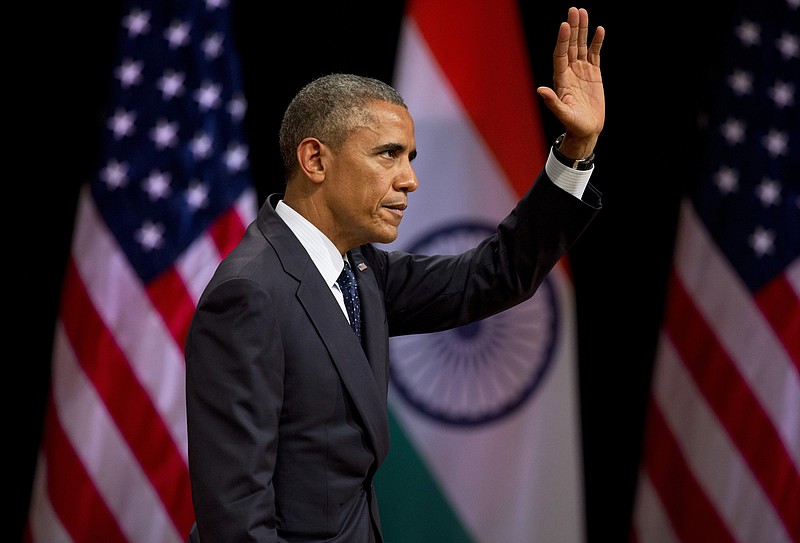NEW DELHI -- President Barack Obama was leading a bipartisan delegation of lawmakers, senior U.S. officials and two former secretaries of state to Saudi Arabia Tuesday to pay respects to the royal family following King Abdullah's death.
Obama cut short the final day of his visit to India to make the trip, departing New Delhi Tuesday afternoon without making his planned visit to the Taj Mahal. Obama's four-hour stop in Saudi Arabia was to include a meeting with new monarch King Salman bin Abdul-Aziz Al Saud and a dinner with other Saudi officials.
Secretary of State John Kerry was joining Obama in Riyadh, along with former Secretaries of State Condoleezza Rice and James Baker, both of whom served Republican presidents. Former White House national security advisers Brent Scowcroft, Sandy Berger and Stephen Hadley were also making the trip, as was Sen. John McCain, R-Ariz. Several lawmakers who traveled with Obama to India, including House Minority Leader Nancy Pelosi, D-Calif., were also joining him in Saudi Arabia.
The visit by the president and a high-level delegation underscores the key role Saudi Arabia plays in U.S. foreign policy in the Middle East. Most recently, Saudi Arabia became one of a handful of Arab nations that have joined the U.S. in launching airstrikes against the Islamic State group in Iraq and Syria.
Yet Obama's presidency also has been marked by strain with the royal family. Abdullah, the 90-year-old monarch who died Friday, had pressed the U.S. to take more aggressive action to force Syrian President Bashar Assad from office. The royal family is also deeply skeptical of Obama's diplomacy with rival Iran.
White House officials said these issues were among those likely to come up during the president's discussions with the king and other Saudi officials.
"It will be a chance for us to make sure that we're in good alignment going forward where we have overlapping interests," said Ben Rhodes, Obama's deputy national security adviser.
Saudi Arabia's new king is a veteran of the country's top leadership, versed in diplomacy from nearly 50 years as the governor of the capital Riyadh and known as a mediator of disputes within the sprawling royal family.
Salman, 79, had increasingly taken on the duties of the king over the past year as his ailing predecessor and half-brother, Abdullah, became more incapacitated. He takes the throne at a challenging time for the kingdom, as oil prices tumble and the U.S.- and Saudi-backed government in Yemen implodes.
In his initial days on the throne, Salman has given little indication that he plans to bring fundamental changes to his country's policies. In a nationally televised address shortly after his half brother's death, Salman vowed to hew to "the correct policies which Saudi Arabia has followed since its establishment."
Obama had originally planned to send Vice President Joe Biden to lead the U.S. delegation to Saudi Arabia. But when White House officials realized that Biden's arrival in Riyadh would coincide with Obama's departure from India, they opted to send the president instead.
